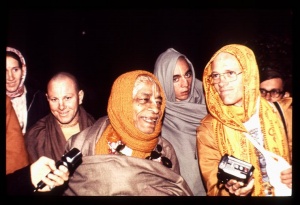CC Madhya 8.249 (1975)

A.C. Bhaktivedanta Swami Prabhupada
Below is the 1996 edition text, ready to be substituted with the 1975 one using the compile form.
TEXT 249
- ‘mukta-madhye kon jīva mukta kari’ māni?’
- ‘kṛṣṇa-prema yāṅra, sei mukta-śiromaṇi’
SYNONYMS
mukta-madhye—among the liberated; kon—what; jīva—living entity; mukta—liberated; kari’—considering as; māni—We accept; kṛṣṇa-prema—one who loves Kṛṣṇa; yāṅra—of whom; sei—such a person; mukta-śiromaṇi—the topmost of all liberated souls.
TRANSLATION
Śrī Caitanya Mahāprabhu then inquired, “Out of all liberated persons, who should be accepted as the greatest?” Rāmānanda Rāya replied, “He who has love for Kṛṣṇa has attained the topmost liberation.”
PURPORT
In Śrīmad-Bhāgavatam (SB 6.14.5), it is said:
- muktānām api siddhānāṁ nārāyaṇa-parāyaṇaḥ
- su-durlabhaḥ praśāntātmā koṭiṣv api mahā-mune
“O great sage, of the many millions of liberated persons and of the millions who have attained perfection, he who is a devotee of Lord Nārāyaṇa is very, very rare. Indeed, he is the most perfect and peaceful person.”